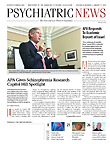FDA Rejects New Antipsychotic Pending More Data
Forest Laboratories and Gedeon Richter announced in November that the FDA rejected their application for cariprazine, an atypical antipsychotic to treat schizophrenia and acute mixed episodes associated with bipolar I disorder in adults.
Though the FDA acknowledged that cariprazine demonstrated effectiveness in treating schizophrenia and mania associated with bipolar disorder in the 2,700 subjects studied in the company’s clinical trials, the agency indicated that additional clinical trial data are required.
Forest Research Institute President Marco Taglietti, M.D., said in a statement, “Given the complex pharmacokinetics and metabolism of cariprazine, we believe this request was made to better define the optimal dosing regimen to maintain the demonstrated efficacy, while minimizing the potential for the development of adverse events generally associated with this class of drug.”
Taglietti said that Forest and Gedeon Richter plan to meet with the FDA in the near future to “define a path forward.”
FDA Bans Products From Indian Drugmaker
The Food and Drug Administration (FDA) took one of the most severe actions in its arsenal November 29, 2013, when it banned all drugs manufactured at an entire facility of a generic drugmaker.
The FDA issued an “import alert” for drugs produced at the Chikalthana, India, factory of Wockhardt Ltd., which resulted in its drugs being pulled from the U.S. market due to unethical manufacturing practices by the company. The decision was prompted by an FDA inspection that found the plant at fault for sanitation issues including urine on facility floors and presence of mold and mildew. The company was also cited for failure to provide documents that FDA officials had requested.
This is not Wockhardt’s first penalty for its manufacturing and oversight processes. In July 2013, the FDA banned all products from the company’s Waluj plant for similar accusations, and the United Kingdom’s Medicine and Health Care Products Regulatory Agency barred the company from making medicines to be sold in Europe.
Wockhardt issued a statement saying that it has “already initiated several steps to address the observations made by the U.S. FDA and shall put all efforts to resolve the matter at the earliest.”
Wockhardt manufactures generic versions of psychiatric drugs such as citalopram, divalproex, and donepezil.
OxyContin Maker Submits Abuse-Resistant Pill
Purdue Pharma, manufacturer of the opioid pain medication, OxyContin , announced that the FDA accepted its application for Targiniq ER, an extended-release tablet that combines oxycodone—the active ingredient in OxyContin—with naloxone, a drug intended to make opioid medicines less addictive. Purdue’s application is based on a 12-week study of 600 patients who had a history of abuse of opioid pain relievers. The company said the trial included data on the drug’s ability to be abused.
In 2010, Purdue was the first company to design a pill form of oxycodone (OxyContin) that was more difficult to crush, break, or dissolve in an effort to reduce the risk that individuals with addictions can snort or inject the drug. The FDA has been pressuring companies to design new pain killers less likely to lead to substance abuse.
Prenatal Exposure To Antidepressants Doesn’t Raise Autism Risk
Both the use of antidepressant medication during pregnancy and the prevalence of autism spectrum disorder (ASD) diagnoses in children have increased over the past two decades, which has raised concern about a possible connection. A study published in Clinical Epidemiology investigated whether such a causal link between prenatal exposure to antidepressants and ASD in the offspring exists and found little evidence of a relationship.
Researchers from Aarhus University and Aarhus University Hospital in Denmark conducted the largest study to date on the correlation between antidepressant medication during pregnancy and ASD in children. They identified more than 660,000 children born from 1996 to 2000 whose mothers were, or were not, prescribed selective serotonin reuptake inhibitor (SSRI) medication during pregnancy. Children’s medical records were evaluated for ASD diagnoses.
The results showed that there was a 2 percent risk of having a child diagnosed with ASD for women who were prescribed SSRIs during pregnancy, compared with a 1.5 percent risk for mothers who did not receive an SSRI prescription.
“We know from previous studies that there is an increased risk for autism, among other things, if the parents have a mental diagnosis such as depression,” said Jakob Christensen, Ph.D., coauthor and a staff specialist at Aarhus University Hospital, “But, in contrast to smaller studies, we see that the risk of having a child with autism is largely the same regardless of whether the mother takes antidepressant medication or not during the pregnancy.” The authors concluded that genetic risk for ASD is likely the major contributing factor leading to development of the disorder.
